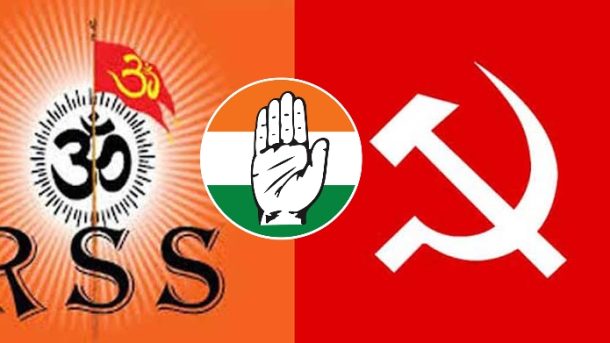RSS (Rashtriya Swayamsevak Sangh) is a Hindu nationalist organization in India, with a focus on cultural and social issues. It is known for its strong commitment to the idea of Hindutva, which emphasizes the cultural and historical importance of Hinduism in India.One positive aspect of RSS is its emphasis on volunteerism and community service. The organization encourages its members to participate in various social and cultural activities, such as helping with disaster relief efforts, promoting education, and working to improve the lives of underprivileged communities.
In Kerala, the RSS has been the subject of criticism and controversy, particularly from the Congress and CPM (Communist Party of India (Marxist)) parties. These parties have historically been opposed to the RSS’s Hindu nationalist ideologies, which they see as divisive and exclusionary.
The Congress and CPM parties have a strong presence and influence in the state’s political and social spheres, and they have often portrayed the RSS as a threat to the state’s secular and pluralistic traditions. They have accused the RSS of promoting communalism, and have pointed to incidents of communal violence and religious intolerance in the state as evidence of this. They also claim that the RSS is working against the secular fabric of the country and promoting divisive ideologies.
It’s worth noting that these parties have a strong influence in the state’s media and educational institutions, which have contributed to the negative perception of the RSS in Kerala. They have been actively spreading their views and ideologies and creating a negative image of RSS among the people.
The views of Muslims and Christians in Kerala on the RSS likely vary, as there is no one monolithic Muslim or Christian community in Kerala. However, many Muslims and Christians in Kerala have historically been critical of the RSS, as they view the organization’s ideology as divisive and discriminatory towards non-Hindus. Some people see RSS as Hindu extremist organization and believe that the agenda of the organization is to discriminate against other religious communities in India.
However, it’s important to remember that the perception of any organization or ideology is shaped by a variety of factors, and it’s not always a straightforward or one-sided issue. The portrayal of RSS by the Congress and CPM parties may have been biased and one-sided, and it’s important to critically evaluate their claims and accusations.
It’s also worth noting that the RSS has denied the accusations of promoting communalism and divisive ideologies, and has emphasized its commitment to social harmony and national unity. The organization’s focus on cultural and national pride, as well as its efforts to promote social harmony, can be beneficial to the state. Many believe that the RSS can help to address issues such as poverty, unemployment, and social inequality, and that it can play a positive role in promoting economic development, social and cultural progress.
It’s important to keep in mind the complexity of the issue and engage in a critical examination of the organization and its beliefs, rather than accepting or rejecting them outright.





